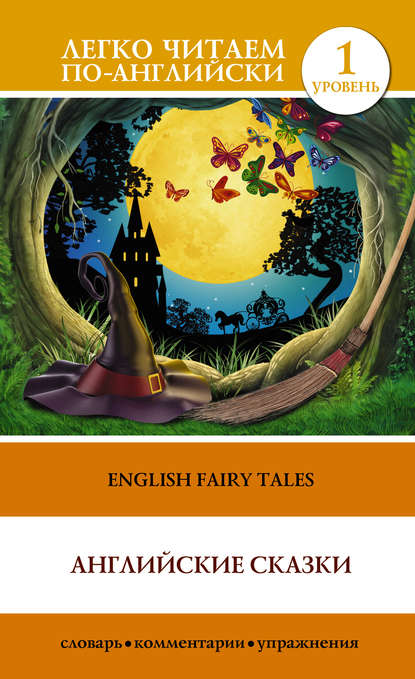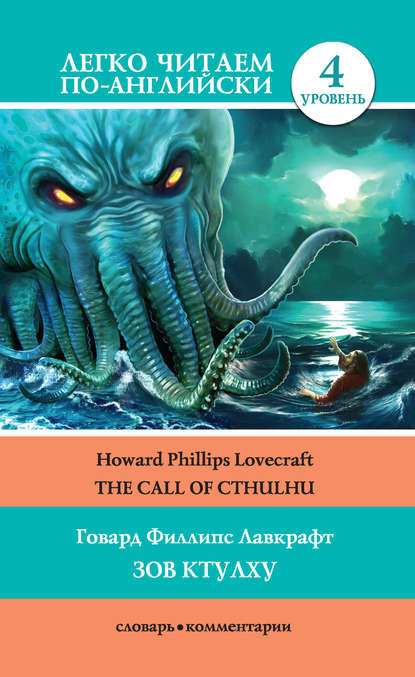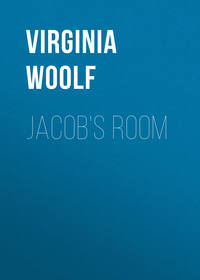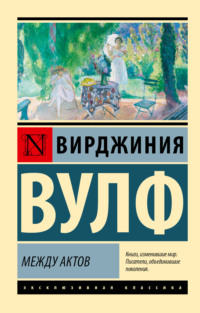
Полная версия
Дом с привидениями. Уровень 2 / A Haunted House
To what, to where? She opened the door. She put her umbrella in the stand. The whiff of beef from the basement; dot, dot, dot. But what I cannot thus eliminate is what I must. With the courage of a battalion and the blindness of a bull. Indubitably, the figures behind the ferns, commercial travellers. There I was hiding them all this time. Rhododendrons will conceal him utterly. I starve. I strive for red and white. But rhododendrons in Eastbourne—in December—on the Marshes’ table—no, no, I dare not. It’s all a matter of crusts and cruets, frills and ferns. Perhaps there’ll be a moment later by the sea.
Moreover, I want to prick through the green fretwork and over the glacis of cut glass. I want to peer and peep at the man opposite. James Moggridge is it, whom the Marshes call Jimmy? Minnie, you must promise not to twitch. James Moggridge sells buttons. The big ones and the little ones on the long cards. Some buttons are peacock-eyed. Others are dull gold. Some are cairngorms. Others are coral sprays.
He travels. On Thursdays, his Eastbourne day, he takes his meals with the Marshes. His red face, his little steady eyes, his enormous appetite. This is primitive. I don’t like it. Let’s see the Moggridge household. Well, James himself mends the family boots on Sundays. He reads Truth. But his passion? Roses and his wife, a retired hospital nurse. Interesting. But she’s of the unborn children of the mind. She is illicit. Like my rhododendrons. How many die in every novel—the best, the dearest, while Moggridge lives. It’s life’s fault. Here’s Minnie. She is eating her egg at the bench. There must be Jimmy at the other end of the line.
There must be Moggridge—life’s fault. Life imposes its laws. Life blocks the way. Life is behind the fern. Life is the tyrant. I assure you I come willingly. Heaven knows what compulsion took me across ferns and cruets, table and bottles. I come irresistibly to lodge myself somewhere on the firm flesh, in the robust spine. Wherever I can penetrate, in the soul, of Moggridge the man. The enormous stability. The spine tough as whalebone, straight as oaktree. The ribs; the flesh; the red hollows. The suck and regurgitation of the heart. And meat and beer fall in brown cubes. So we reach the eyes. Behind the aspidistra they see something: black, white, dismal. Now the plate again. Behind the aspidistra they see elderly woman; “Marsh’s sister”; the tablecloth now.
“Marsh will know what’s wrong with Morrises.”
Cheese. The plate again. Turn it round—the enormous fingers; now the woman opposite. “Marsh’s sister—not a bit like Marsh. She is a wretched, elderly female. You must feed your hens. Why is she twitching? Not what I said? Dear, dear, dear! these elderly women. Dear, dear!”
Yes, Minnie. I know you twitched. But one moment—James Moggridge.
“Dear, dear, dear!”
How beautiful the sound is! Like the knock of a mallet on a timber. Like the throb of the heart of an ancient whaler.
“Dear, dear!”
A bell for the souls of the fretful to soothe them and solace them. “So long. Good luck to you!” and then, “What’s your pleasure?” Though Moggridge will pluck his rose for her, that’s over[6]. Now what’s the next thing?
“Madam, you’ll miss your train”.
That’s the sound that reverberates. That’s St. Paul’s[7] and the motor-omnibuses[8]. Oh, Moggridge, you won’t stay? You must leave? Are you driving through Eastbourne this afternoon in one of those little carriages? Are you the man who is behind green cardboard boxes? Are you the man who sometimes sits so solemn like a sphinx? Please tell me. But the doors close. We shall never meet again. Moggridge, farewell!
Yes, yes, I’m coming. Right up to the top of the house. One moment I’ll linger. How the mud goes round in the mind! What a swirl these monsters leave! James Moggridge is dead now. He is gone for ever. Well, Minnie,
“I can face it no longer”.
If she said that… Let me look at her. She is brushing the eggshell. She said it certainly. When the self speaks to the self, who is speaking? The entombed soul, the spirit. The self that took the veil and left the world. A coward perhaps, yet somehow beautiful. It flits with its lantern restlessly up and down the dark corridors.
“I can bear it no longer,” her spirit says. “That man at lunch—Hilda—the children”.
Oh, heavens, her sob! The spirit is wailing its destiny, on the carpets—meager footholds—all the vanishing universe. Love, life, faith, husband, children.
“Not for me—not for me.”
But then—the muffins, the bald elderly dog? Bead mats and the consolation of underlinen. If Minnie Marsh is in the hospital, nurses and doctors will exclaim… There’s the vista. There’s the vision. There’s the distance—the blue blot at the end of the avenue.
“Benny, to your basket, sir, and see what mother’s brought you!”
So, you take the glove with the worn thumb. You renew the fortifications, you thread the grey wool.
In and out, across and over. You are spinning a web through which God himself… Hush, don’t think of God! How firm the stitches are! You must be proud. Let nothing disturb her. Let the light fall gently. Let the clouds show an inner vest of the first green leaf. Let the sparrow perch on the twig and shake the raindrop. Why look up? Was it a sound, a thought? Oh, heavens!
Back again to the thing you did. Back again to the plate glass with the violet loops?
But Hilda will come. Ignominies, humiliations, oh! Close the breach.
Minnie Marsh mended her glove. She laid it in the drawer. She shuts the drawer with decision. I saw her face in the glass. Next she laces her shoes. Then she touches her throat. What’s your brooch? Mistletoe? And what is happening? The moment is coming. The threads are racing. Niagara’s ahead. Here’s the crisis!
Heaven be with you! Down she goes. Courage, courage! Face it, be it! For God’s sake don’t wait on the mat now! There’s the door! I’m on your side. Speak! Confront her. Confound her soul![9]
“Oh, I beg your pardon! Yes, this is Eastbourne. I’ll reach it down for you. Let me try the handle.”
But Minnie, I know you—I’m with you now.
“That’s all your luggage?”
“Much obliged, I’m sure.”
But why do you look about you? Hilda won’t come to the station, nor John. Moggridge is driving at the far side of Eastbourne.
“I’ll wait by my bag, ma’am. That’s safe. He will meet me. Oh, there he is! That’s my son.”
So they walk off together.
Well, but I’m confounded. Surely, Minnie, you know better! A strange young man. Stop! I’ll tell him—Minnie! Miss Marsh! I don’t know though. There’s something queer in her cloak as it blows. Oh, but it’s untrue, it’s indecent. . Look how he bends as they reach the gateway. She finds her ticket. What’s the joke? Off they go[10], down the road, side by side. Well, my world is ruined. What do I stand on? What do I know? That’s not Minnie. There never was Moggridge. Who am I? Life is bare.
The last look of them. He is stepping from the kerb and she is following him. Mysterious figures! Mother and son. Who are you? Why do you walk down the street? Where will you sleep tonight? Where will you sleep tomorrow? Oh, how it whirls and surges! I start after them. People drive this way and that. The white light splutters and pours. Plate-glass windows. Carnations; chrysanthemums. Ivy in dark gardens. Milk carts at the door. Wherever I go, mysterious figures, I see you. Mothers and sons; you, you, you. I hasten. I follow. This must be the sea. The landscape is grey; dim as ashes. The water murmurs and moves. I fall on my knees. I go through the ritual. I adore you, unknown figures. I open my arms. I embrace you. I’ll draw you to me—adorable world!
The String Quartet
Well, here we are. Cast your eye over the room. You will see that Tubes[11] and trams and omnibuses, private carriages, landaus with bays in them, are weaving threads from one end of London to the other. Yet I begin to doubt…
If indeed it’s true, as they say, that Regent Street is closed, and the weather not cold for the time of year… If I forgot to write about the leak in the larder… If I left my glove in the train… If the ties of blood require to accept cordially the hand which is offered…
“Seven years since we met!”
“The last time in Venice.”
“And where are you living now?”
“Well, the late afternoon suits me the best[12].”
“But I knew you at once!”
“Still, the war is the war.”
Such little arrows. One is launched. Another presses forward. What chance is there?
Of what? It becomes every minute more difficult to say why, in spite of everything, I sit here. I believe I can’t now say what happened. I can’t now say when it happened.
“Did you see the procession?”
“The King looked cold.”
“No, no, no. But what was it?”
“She bought a house at Malmesbury.”
“How lucky to find one!”
On the contrary, it is sure that she is damned. Whoever she may be. Why fidget? Why so anxious about the cloaks and gloves, whether to button or unbutton? Was it the sound of the second violin the ante-room? Here they come. Four black figures. They are carrying instruments. They seat themselves under the downpour of light. They rest the tips of their bows on the music stand. They lift them with a simultaneous movement. They poise them lightly. The first violin counts one, two, three…
Flourish, spring, burgeon, burst! The pear tree on the top of the mountain. Fountains jet. Drops descend. But the waters of the Rhone flow swift and deep. They race under the arches. The fish rushed down by the swift waters. Now the fish swept into an eddy where. It’s difficult. Conglomeration of fish all in a pool. Jolly old fishwives, obscene old women. How deeply they laugh and shake and rollick, when they walk, from side to side, hum, hah!
“That’s an early Mozart, of course.”
“But the tune, like all his tunes, makes one despair[13]. I mean hope. What do I mean? That’s the worst of music! I want to dance. I want to laugh. I want to eat pink cakes, yellow cakes. I want to drink thin, sharp wine. Or an indecent story, now—I can relish that. The older ones like indecency. Hah, hah! I’m laughing. What at? You said nothing. Nor did the old gentleman opposite. But suppose—suppose… Hush!”
The moon comes through the willow boughs. I see your face. I hear your voice. The bird is singing. We pass the osier bed. What are you whispering? Sorrow, sorrow. Joy, joy. Together, like reeds in moonlight. Crash!
The boat sinks. The figures ascend. But they taper to a dusky wraith which draws its twofold passion from my heart. For me it sings. It unseals my sorrow. It thaws compassion. It floods with love the sunless world. Soar, sob, sink to rest, sorrow and joy.
Why then grieve? Ask what? Remain unsatisfied? Rose leaves are falling. Falling. Ah, but they cease. One rose leaf is falling from an enormous height. It is like a little parachute from an invisible balloon. It won’t reach us.
“No, no. I noticed nothing. That’s the worst of music—these silly dreams. The second violin was late, you say?”
“There’s old Mrs. Munro, she goes out on this slippery floor. Poor woman. Blinder each year”
Eyeless old age, grey-headed Sphinx. There she stands on the pavement. She is beckoning, so sternly, the red omnibus.
“How lovely! How well they play! How-how-how!”
Simplicity itself. The feathers in the hat are bright. They are pleasing as a child’s rattle. Very strange, very exciting.
“How-how-how!” Hush!
These are the lovers on the grass.
“If, madam, you take my hand…”
“Sir, I can trust you with my heart. Moreover, we left our bodies in the banqueting hall. Those on the turf are the shadows of our souls.”
“Then these are the embraces of our souls.”
The lemons nod assent. The swan pushes from the bank. The swan floats into mid stream.
“But to return. He followed me down the corridor. We turned the corner. He trod on the lace of my petticoat. I cried ‘Ah!’ I stopped. He drew his sword. He cried, ‘Mad! Mad! Mad!’ I screamed. The Prince came out in his velvet skull-cap and furred slippers. He snatched a rapier from the wall. The King of Spain’s gift, you know. I escaped. But listen! The horns!”
The gentleman replies fast to the lady. She runs up the scale with witty exchange of compliment. The words are indistinguishable though the meaning is plain enough. Love, laughter, flight, pursuit, celestial bliss. The green garden, the pool, lemons, lovers, and fish are all dissolved in the opal sky. Tramp and trumpets. Clang and clangour. March of myriads.
But this city to which we travel has neither stone nor marble. It stands unshakable. The pillars are bare. The pillars are auspicious to none. They cast no shade. They are resplendent and severe. I fall back. I eager no more. I desire to go. I desire to find the street. I desire to mark the buildings. I desire to greet the applewoman. I desire to say to the maid who opens the door:
“A starry night.”
“Good night, good night. You go this way?”
“Alas. I go that.”
The Mark on the Wall
Perhaps it was the middle of January in the present year. I looked up and saw the mark on the wall. In order to fix a date it is necessary to remember what one saw. So now I think of the fire. The steady film of yellow light upon the page of my book. Three chrysanthemums in the round glass bowl on the mantelpiece. Yes, it was the winter time. We finished our tea. I remember that I was smoking a cigarette. I looked up. I saw the mark on the wall. I looked up through the smoke of my cigarette. My eye lodged for a moment upon the burning coals. That old fancy of the crimson flag on the castle tower came into my mind. I thought of the cavalcade of red knights. The sight of the mark interrupted the fancy. It is an old fancy, an automatic fancy. The mark was a small round mark. It was black upon the white wall, about six or seven inches above the mantelpiece.
Our thoughts swarm upon a new object. As ants carry a blade of straw so feverishly, and then leave it. Was that mark made by a nail? It must be for a miniature. The miniature of a lady with white powdered curls, powder-dusted cheeks, and lips like red carnations. Some people had this house before us. They chose an old picture for an old room. They were very interesting people. I think of them so often, in such queer places. I will never see them again. I will never know what happened next. They wanted to leave this house. They wanted to change their style of furniture, so he said.
But for that mark, I’m not sure about it. I don’t believe it was made by a nail. It’s too big. It is too round for that. I may get up. But if I get up and look at it, I won’t be able to say for certain[14]. No one knows how it happened.
Oh! dear me! The mystery of life! The inaccuracy of thought! The ignorance of humanity! To show how very little control of our possessions we have. What an accidental affair is this life?
What an accidental affair is our civilization? Let me take some things. Where are they? Did the cat gnaw them? Did the rat nibble them? Three pale blue canisters of book-binding tools[15]. Then there were the bird cages. Then the iron hoops. Then the steel skates, the Queen Anne coal-scuttle. Then the bagatelle board, the hand organ. All gone, and jewels, too. Opals and emeralds lie about the roots of turnips. The wonder is that I have any clothes on my back. Why, if one wants to compare life to anything, one must liken it to the Tube. Fifty miles an hour! At the feet of God entirely naked! Yes, that can express the rapidity of life. Than can express the perpetual waste and repair. All is so casual. All is so haphazard.
But after life. Thick green stalks are pulling down slowly. The cup of the flower turns over. It deluges one with purple and red light. Why, after all, will one be born there? One is born helpless, speechless, unable to focus one’s eyesight. One is born at the toes of the Giants. The trees are like men and women. There will be nothing but spaces of light and dark. And they are intersected by thick stalks, rose-shaped blots of an indistinct colour—dim pinks and blues. They will, as time goes on, become more definite. They will become…—I don’t know what.
And yet that mark on the wall is not a hole at all. It may even be caused by some round black substance. Such as a small rose leaf. I am not a very vigilant housekeeper. Look at the dust on the mantelpiece, for example. The dust which, so they say, buried Troy. Only fragments of pots utterly refuse annihilation, as one can believe.
The tree outside the window taps very gently on the pane. I want to think quietly. I want to think calmly. I want to think spaciously. I want to slip easily from one thing to another. I want to slip without any sense of hostility, or obstacle. I want to sink deeper and deeper, away from the surface. To steady myself, let me catch the first idea.
Shakespeare. Well, he will do[16] as well as another. A man in an arm-chair who looked into the fire, so. A shower of ideas fell perpetually from some very high Heaven down. Through his mind. He leant his forehead on his hand. People were looking in through the open door. It was a summer’s evening. But how dull this is, this historical fiction! It doesn’t interest me at all.
“And then I came into the room. They were discussing botany. I said I saw a flower on a dust heap on the site of an old house in Kingsway. The seed saw the reign of Charles the First. What flowers grew in the reign of Charles the First?” I asked.
But I don’t remember the answer. Tall flowers with purple tassels. And so on. All the time I create the figure of myself in my own mind. It was lovingly, stealthily. It is curious how instinctively one protects the image of oneself from idolatry. It is very important.
The looking-glass smashes. The image disappears. The romantic figure with the green of forest depths disappears. We see only that shell of a person. It is an airless, shallow, bald, prominent shell. We face each other in omnibuses and underground railways. We are looking into the mirror. The novelists in future will realize more and more the importance of these reflections. Of course there is not one reflection. There is an almost infinite number. They will explore the depths. They will pursue the phantoms. Let us follow the example of the Greeks did and Shakespeare. But these generalizations are very worthless. The military sound of the word is enough. It recalls articles and cabinet ministers.
Generalizations bring back somehow Sunday in London, Sunday afternoon walks, Sunday luncheons. People sat all together in one room until a certain hour,. And nobody liked it. There was a rule for everything. The rule for tablecloths at that particular period was like this: they were made of tapestry with little yellow compartments upon them. Like the carpets in the corridors of the royal palaces. Tablecloths of a different kind were not real tablecloths. How shocking! How wonderful it was to discover that these real things were not entirely real. Sunday luncheons, Sunday walks, country houses, and tablecloths. They were indeed half phantoms. The damnation which visited the disbeliever in them was only a sense of illegitimate freedom. What now takes the place of those things I wonder? Men perhaps. The masculine point of view governs our lives. It sets the standard. It established Whitaker’s Table of Precedency[17], the mahogany sideboards and the Landseer prints[18], Gods and Devils, Hell and so forth. They leave us all with a sense of illegitimate freedom. If freedom exists, of course.
In certain lights that mark on the wall seems volumetric. Nor is it entirely circular. I cannot be sure, but it cast a perceptible shadow. I run my finger down that strip of the wall. It will mount and descend. A smooth tumulus like those barrows on the South Downs which are either tombs or camps. Of the two I prefer the tombs, like most English people. There must be some book about it. Some antiquary dug up those bones. He gave them a name.
What sort of a man is an antiquary, I wonder? Retired Colonels for the most part[19], I daresay. They examine clods of earth and stone. They get into correspondence with the clergy. The Colonel himself feels philosophic. He accumulates evidence. He finally believes in the camp. Suddenly a stroke kills him. His last conscious thoughts are not of wife or child. His last conscious thoughts are of the camp and that arrow-head there. It is now at the local museum, together with the foot of a Chinese murderess, a handful of Elizabethan nails, Tudor clay pipes, a piece of Roman pottery, and Nelson’s wineglass.
No, no, nothing is proved. Nothing is known. I get up at this very moment. I ascertain that the mark on the wall is really the head of a gigantic old nail. But what shall I gain? Knowledge?
And what is knowledge? Our learned men are the descendants of witches and hermits. They crouched in caves. They interrogated shrew-mice. They wrote down the language of the stars.
Yes, we can imagine a very pleasant world. A quiet, spacious world, with the flowers so red and blue in the open fields. A world without professors or specialists or house-keepers. How peaceful it is down here! How peaceful it is in the centre of the world!
I must jump up and see for myself what that mark on the wall really is. A nail, a rose-leaf, a crack in the wood?
This thought is threatening mere waste of energy, even some collision with reality. Who will ever be able to lift a finger against Whitaker’s Table of Precedency? The Lord High Chancellor[20] follows the Archbishop of Canterbury. The Archbishop of York follows the Lord High Chancellor. Everybody follows somebody. Such is the philosophy of Whitaker. The great thing is to know who follows whom. Whitaker knows. Let that comfort you.
I understand Nature’s game. I take action to end any thought that threatens to excite or to pain. Hence, I suppose, our slight contempt for men of action comes. Men, we assume, who don’t think. Still, I want to stop the disagreeable thoughts.
I feel a satisfying sense of reality. It turns the two Archbishops and the Lord High Chancellor to the shadows of shades. Here is something definite. Here is something real. Thus, one wakes from a midnight dream of horror. One hastily turns on the light. One lies quiescent. One worships the chest of drawers[21]. One worships solidity. One worships reality. One worships the impersonal world. The world is a proof of some existence other than ours. That is what one wants to be sure of[22].
Wood is a pleasant thing to think about. It comes from a tree. Trees grow. We don’t know how they grow. For years and years they grow. They grow in meadows, in forests. They grow by the side of rivers.
The cows swish their tails beneath them on hot afternoons. They paint rivers green. I like to think of the fish. I like to think of water-beetles. I like to think of the tree itself. The slow, delicious ooze of sap. I like to think of it, too, on winter’s nights. The song of birds must sound very loud and strange in June.
One by one the fibres snap beneath the immense cold pressure of the earth. Then the last storm comes. The high branches drive deep into the ground. Even so, life isn’t done with[23]. There are a million patient, watchful lives still for a tree. They are all over the world, in bedrooms, in ships, on the pavement. They are in lining rooms, where men and women sit after tea. This tree is full of peaceful thoughts, happy thoughts. I want to take each one separately.
Where was I? What was it? A tree? A river? The Downs? Whitaker’s Almanack? The fields of asphodel? I can’t remember anything.
Everything is moving. Everything is falling. Everything is slipping. Everything is vanishing. Someone is standing over me. Someone is saying:
“I’m going out to buy a newspaper.”
“Yes?”
“Though why buy newspapers? Nothing ever happens. Curse this war; God damn this war! I don’t see why we have a snail on our wall.”
Ah, the mark on the wall! It was a snail.
The New Dress
Mrs. Barnet handed her the mirror. Mabel took her cloak off. She had her first serious suspicion that something was wrong. Thus she confirmed the suspicion. It was not right, not quite right. She went upstairs. She greeted Clarissa Dalloway. She went straight to the far end of the room, to the corner. There a looking-glass hung. She looked. No! It was not right. And at once the misery, the profound dissatisfaction met her, relentlessly. She always tried to hide it.













